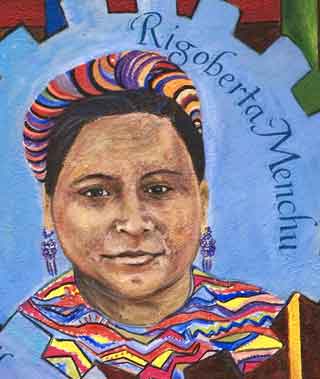 |
| Rigoberta Menchú speaking in Spanish (1 MB mp3) From Freedom Archives audio archives Photo: Scott Braley |
 |
| Rigoberta Menchú speaking in Spanish (1 MB mp3) From Freedom Archives audio archives Photo: Scott Braley |
Rigoberta Menchú was born into a poor Indian peasant family, and raised in the Quiche branch of the Mayan culture in Guatemala. As a teenager, she became involved in social reform programs of the Catholic Church and was active in the women's rights movement. Like her father, she joined the CUC (Committee of the Peasant Union) in 1979, after members of her family had suffered persecution.
During the 1970s and 1980s in Guatemala, tensions between the descendants of European immigrants and the native Indian population increased. At this time Menchú became active in large demonstrations, joined the radical 31st of January Popular Front, and encouraged the Indian peasant population to resist oppression.
In 1981, because of her activism, she had to leave Guatemala and flee to Mexico, where she organized peasants' resistance movements and was co-founder of the United Representation of the Guatemalan Opposition (RUOG).
Through her life story, which was published as I, Rigoberta Menchú and a film entitled When the Mountains Tremble, which illustrates the struggles and sufferings of the Maya people. Menchú also became well known in the Western world as an advocate of Indian rights and ethno-cultural reconciliation.
Rigoberta Menchú was awarded the 1992 Nobel Peace Prize in recognition of her work for social justice and ethno-cultural reconciliation based on respect for the rights of indigenous people. She accepted the Prize in the name of all indigenous people.

Photo Credit: Santa Clara University